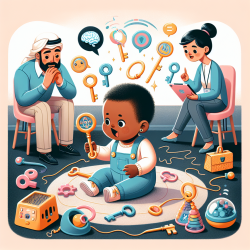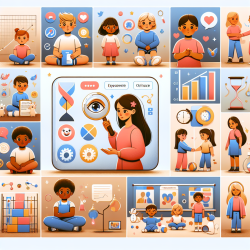Introduction
In the dynamic field of speech-language pathology, practitioners are constantly seeking innovative methods to enhance therapeutic outcomes. A recent study titled "Application of the Theoretical Domains Framework and the Behaviour Change Wheel to Understand Physicians’ Behaviors and Behavior Change in Using Temporary Work Modifications for Return to Work: A Qualitative Study" offers valuable insights that can be adapted to improve child therapy practices. This blog explores how these frameworks can be leveraged to foster better communication and language development in children.
Understanding the Frameworks
The Theoretical Domains Framework (TDF) and the Behaviour Change Wheel (BCW) are powerful tools designed to analyze and influence behavior change. Originally applied in occupational health, these frameworks can be adapted to the context of child therapy. By understanding the factors that influence behavior, practitioners can design targeted interventions that address the unique needs of each child.
Key Insights from the Study
The study identifies three key behaviors in the application of temporary work modifications: initiating the process, making recommendations, and following up. These behaviors are influenced by factors related to capability, opportunity, and motivation. In the context of child therapy, these insights can be translated into actionable strategies to enhance therapeutic practices.
Applying the Frameworks to Child Therapy
- Capability: Just as physicians need knowledge and skills to apply work modifications, speech-language pathologists require a deep understanding of communication disorders and effective intervention strategies. Continuous professional development and reflective practice are essential to build this capability.
- Opportunity: The physical and social environment plays a crucial role in therapy. Creating a supportive and resource-rich environment, both in-person and online, can facilitate successful interventions. Collaboration with parents, teachers, and other stakeholders is vital to create opportunities for language development.
- Motivation: Practitioners must be motivated to implement evidence-based practices and remain committed to each child's progress. Setting clear goals and celebrating small victories can enhance motivation and drive positive outcomes.
Encouraging Further Research
The study underscores the importance of using theoretical frameworks to inform practice. Practitioners are encouraged to delve deeper into these frameworks and explore their application in child therapy. By doing so, they can contribute to the growing body of research and improve therapeutic outcomes for children.
Conclusion
The application of the Theoretical Domains Framework and the Behaviour Change Wheel offers a structured approach to understanding and influencing behavior change in therapy. By leveraging these frameworks, practitioners can enhance their skills and create meaningful impacts in the lives of children. To read the original research paper, please follow this link: Application of the Theoretical Domains Framework and the Behaviour Change Wheel to Understand Physicians’ Behaviors and Behavior Change in Using Temporary Work Modifications for Return to Work: A Qualitative Study.










